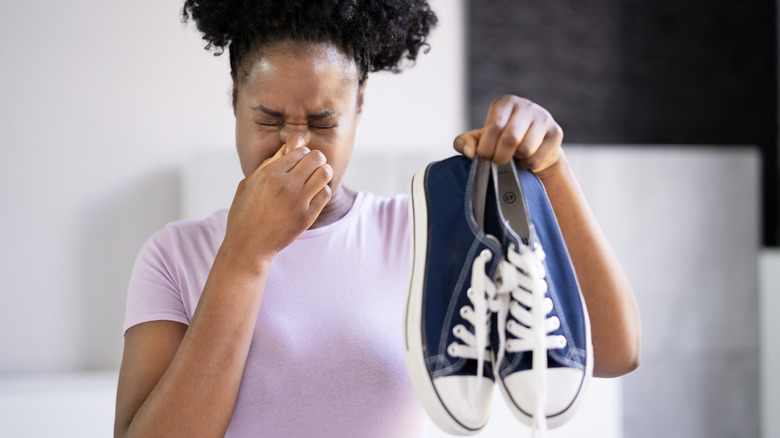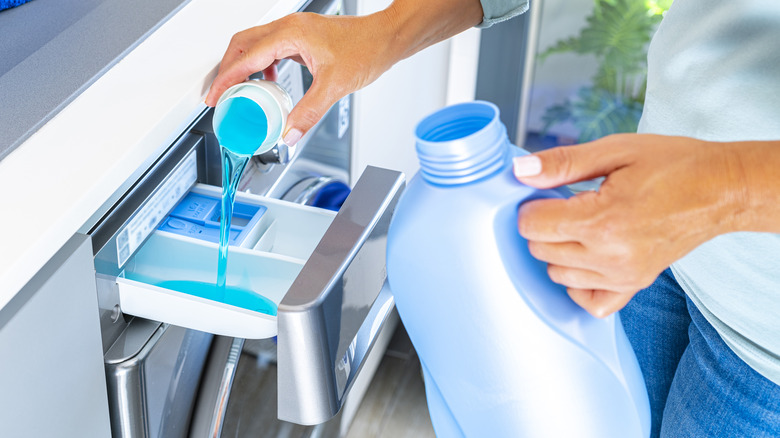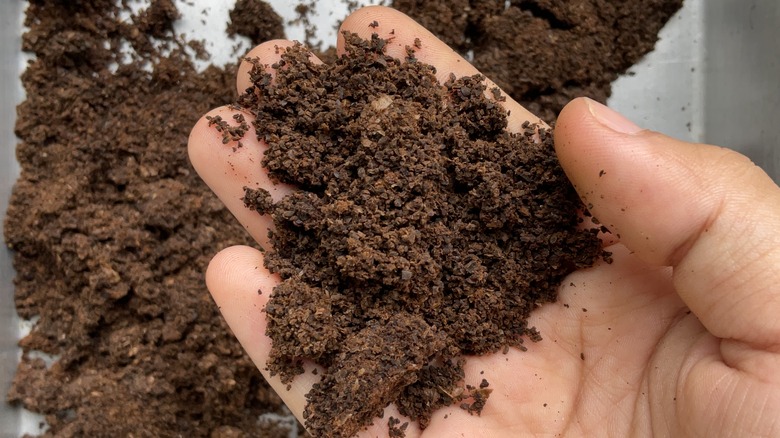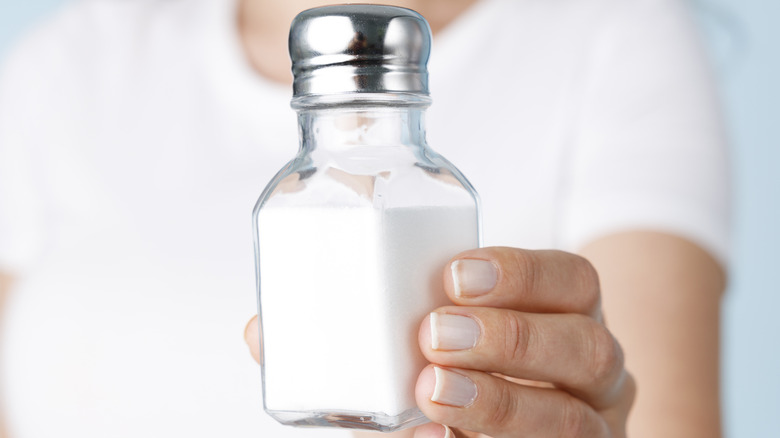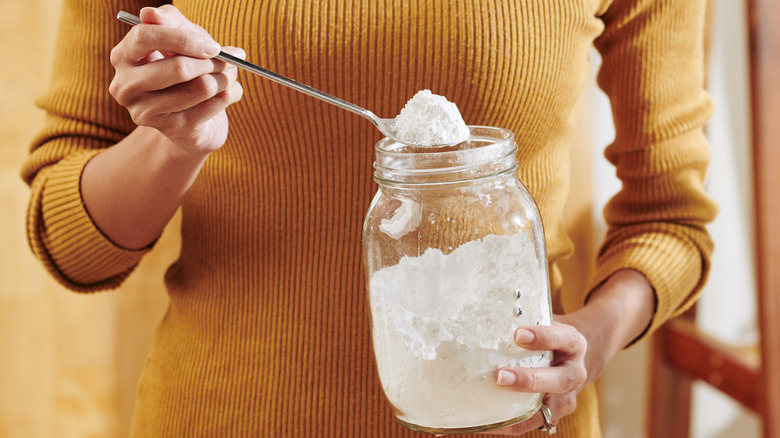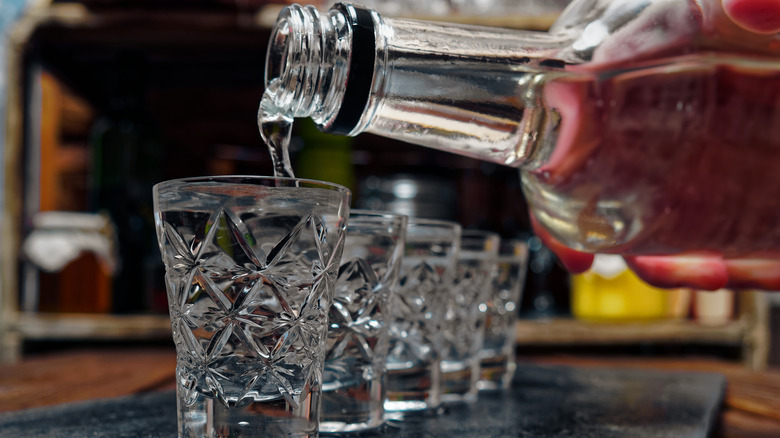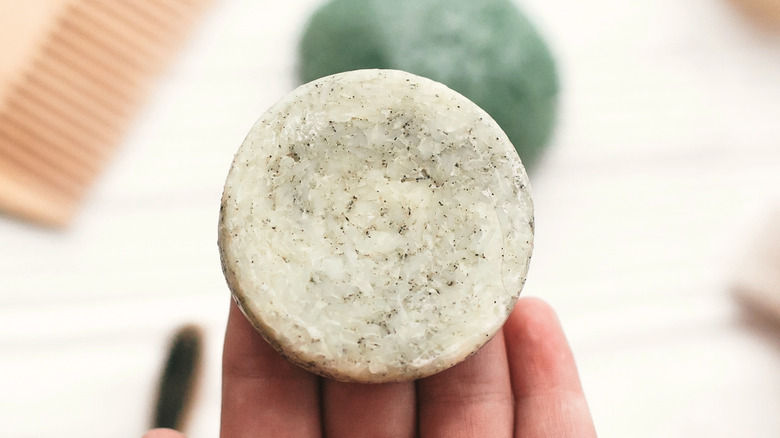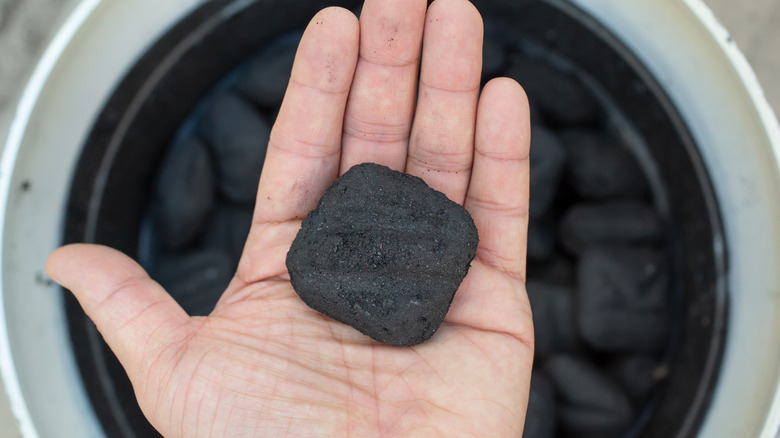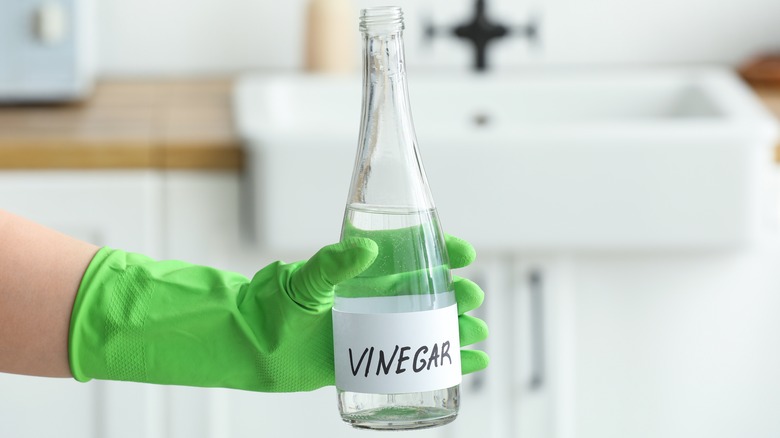Eliminate Smelly Shoe Odors With These Ingredients You Already Have
We may receive a commission on purchases made from links.
Smelly shoes are a nuisance at best and an embarrassment at worst. Unfortunately, your favorite sneakers are no match for your feet, as they have over 500,000 sweat glands between them and the ability to produce a pint of sweat daily. The situation worsens if you live in a hot climate, sweat more than the average person, or love to exercise. However, sweat is just a piece (albeit a big one) of the smelly footwear puzzle; the real culprit is the bacteria growing happily on your foot. These microorganisms break down the leucine (an amino acid) in your sweat and produce isovaleric acid as a byproduct, leading to the nose-curling stench.
The simplest way to prevent smelly shoes is to practice good hygiene, with the Centers for Disease Control and Prevention recommending washing your feet daily. Drying them afterward, especially between the toes, is vital to check the growth of moisture-loving bacteria. Also, don't wear the same pair of shoes two days in a row. Switch them out every day or more often if they feel damp. Bonus points if you wear socks made of breathable fabrics (like cotton) or padded socks, which absorb moisture. Another thing you can do is apply foot powder to maintain dry feet and remove sweat from the equation. But if all else fails, fortunately, the secret to deodorizing smelly shoes may already be in your kitchen or laundry room.
Detergent isn't just meant for your dirty laundry
Although detergent is primarily used to clean dirty garments, it can also be used to wash shoes, thus removing bacteria and eliminating the source of the smell. Be sure to check the manufacturer's instructions to determine whether your shoes are machine washable or should be washed by hand to avoid damaging them. Either way, remove the laces and insoles before washing.
If your shoes are machine washable, tuck them inside a mesh garment bag to keep them safe from the washer's relentless tumbling. Add a few towels or clothes to stabilize the load; just make sure they are old, as new ones might stain your shoes. It is best to use liquid detergent rather than powder, which may not adequately dissolve). Then, set the machine on a cold, delicate setting with slow to no spin and let it work its magic. If your shoes aren't machine-friendly, combine detergent or dish soap with warm water and gently clean them with a soft-bristled brush.
Once your shoes, laces, and insoles are clean, leave them to dry in the sun or overnight. You can place old rags or paper towels inside to help speed along the process, but never put your shoes in the dryer because the heat might damage them beyond repair. You'll want to repeat this process every couple of weeks to keep funky shoe odors at bay.
Toss used coffee grounds inside smelly shoes
Stop throwing used coffee grounds in the trash. Why? The caffeine found in coffee contains nitrogen, which can absorb foul scents from your smelly shoes. Just be sure to dry the grounds completely first since wet coffee grounds can promote bacterial growth or stain your footwear. To do so, spread them on a baking tray and pop them in the oven at 175 to 200 degrees Fahrenheit for one to two hours. Alternatively, let them air-dry for a week or two by spreading them out on a baking sheet over a layer of paper towels.
Once your coffee grounds are dry, grab a couple of old pairs of pantyhose or orphaned socks, put them inside, and knot the tops off (or tie them with a rubber band). Stuff one into each shoe and leave them overnight. After the smell is gone, store your DIY smell absorbers in an airtight container and bring them out again as needed. While smelly shoes will be a thing of the past with this unexpected deodorizing hack, be sure to keep them out of reach of your pets, for whom ingesting the coffee grounds may prove toxic.
Grab your salt shaker from the kitchen
Salt is a kitchen staple. But why should you be sprinkling salt into your stinky shoes? The reason is simple: Salt is antibacterial by nature and is great at absorbing moisture. This means this household ingredient will kill bacteria and absorb sweat, thus removing odor.
All you have to do is grab your shaker and generously sprinkle salt into your smelly shoes. Tilt each one back and forth to ensure the salt reaches the toe area, and use your fingers to rub it around gently to cover the insoles sufficiently. Let your shoes sit for 24 hours, and then vacuum or brush them out to remove the salt particles.
If this seems messy and the smell isn't too bad, you can fill a couple of coffee filters with salt and place them in your shoes instead, but direct contact with salt is the best way to eliminate odors. Note that this method works best on mesh and canvas shoes and won't work for leather or suede.
Put baking soda to use
Since smelly shoe odors come from isovaleric acid, they can also be eliminated by offsetting the low pH with an alkali, like baking soda. As a bonus, the baking soda will absorb excess moisture, making your shoes inhospitable for sweat-happy bacteria. So grab a box from your pantry and start sprinkling.
A tablespoon for each shoe should do the trick, although bigger shoes might require more. Shake your shoes back and forth to ensure the baking soda gets distributed throughout, and let them sit for 24 hours before emptying them. Mix a few drops of your preferred essential oil(s) into the baking soda before sprinkling it inside your shoes to make them smell even better.
This method still works for leather and suede if you use a barrier (otherwise, baking soda may dry them out). Grab a couple of old socks (coffee filters or other cloths work, too) and fill them with 1 to 2 tablespoons of baking soda each. Ensure the baking soda reaches the bottom, tie them off directly above the baking soda, and slip them inside your shoes for 24 hours.
Bring out your bottle of vodka
Vodka can also be used to deodorize your funky-smelling shoes. This ingredient works because the alcohol focuses on the main culprit, eliminating all the bacteria hiding inside, thus leaving your footwear fresh. Admittedly, vodka has a strong odor initially, but it'll be gone once the liquid evaporates, so don't worry about your shoes smelling like alcohol. The best part, though? You don't have to bring out the top-shelf vodka; the cheap stuff you'd rather not drink or serve your guests will work fine.
Pour some vodka into a spray bottle and spray generously inside your smelly shoes. Ensure you cover every inch — you don't want any bacteria escaping from the vodka's clutches. If the smell isn't too bad, you can use a 2:1 ratio of vodka to water instead. Just make sure your shoes are dry before donning them again. If you don't have vodka handy (or would rather not use it), antiperspirant spray works too. Alternatively, grab the bottle of rubbing alcohol from your first aid kid and apply it generously on the insoles with your fingers.
Slide in a bar of soap
One of the many unexpected household uses for a bar of soap is to fight shoe smell. This unassuming personal care product both kills the odor-causing bacteria nesting in your shoes and readily absorbs the odor itself. But that's not even the best part. It'll replace the sulfuric stench with its signature scent, making your shoes smell wonderful.
Simply slip one bar of soap inside each of your smelly shoes and leave them overnight. If the odor isn't strong, you shouldn't even have to wait that long; a few hours should do the trick. That said, this hack comes with two caveats.
One, don't use a wet bar of soap. Doing so will only aggravate the issue instead of removing the foul smell since bacteria love a damp environment. Two, if you have dogs, make sure they don't accidentally ingest the soap, which can cause gastrointestinal problems such as vomiting and diarrhea or even damage their mouth or stomach.
Charcoal to the rescue
The charcoal briquettes you normally reserve for your barbecue or activated charcoal can also keep your shoes smelling fresh thanks to charcoal's natural ability to absorb foul odors (although note that there have not been any scientific studies on how well it works for fabrics).
For charcoal briquettes, grab a couple of old socks or small cloths and stuff a few inside each one. Next, place them inside your shoes and leave them overnight; the smell should be gone by morning. For activated charcoal, add a few teaspoons. You may also want to wrap it in two layers to protect your shoes from the ink-colored substance.
If this sounds like a hassle, you can purchase dedicated shoe deodorizers and simply slip them inside. Marsheepy's six-pack of shoe deodorizer bags contain activated bamboo charcoal, lasts up to two years (provided you give them 3–5 hours of direct sunlight at least once a month), and costs around $10 on Amazon.
Stuff old newspapers inside the stinky shoes
One of the many clever ways to repurpose old newspapers to use around the house is to de-stink your stinky shoes. Newspapers help remove the reeking odor from your footwear since they absorb moisture, thus inhibiting the growth of odor-causing bacteria.
But that's not the only reason to use newspapers. The ink on newspapers contains carbon, which is handy when dealing with stubborn shoe smells. If you don't subscribe to a print version, ask a neighbor, friend, or parent to give you a few pages.
This hack is as easy as it sounds. Just crumple up a few pieces of newspaper, stuff them inside the offending footwear, and leave them overnight. If you want your shoes to smell amazing, not just fresh, apply a few drops of vanilla essential oil to the newspaper before crumpling it into a ball and stuffing it inside.
Don't forget about vinegar
Vinegar's reputation as a versatile cleaning tool is well-known. But did you know vinegar is the budget-friendly solution to even the stinkiest of shoes? The secret is the acetic acid it contains. The acid molecules attach themselves to the stench-causing volatile ones, neutralizing bad odors. Acetic acid also has antibacterial properties. That said, only use white vinegar to deodorize your shoes. Varieties like balsamic and apple cider might stain them.
Grab a spray bottle and combine vinegar and water in a 1:1 ratio. If you don't particularly like the smell, add 12 to 24 drops of your preferred essential oil to mask it. Shake the bottle to mix the ingredients before aiming it at your shoes and generously misting the insides (don't spray the exterior since vinegar may cause color bleeding). Then, place the footwear in a well-ventilated spot and leave it overnight to air-dry. While some experts suggest spraying shoes regularly to keep them smelling fresh 24/7, others caution that this could damage them.
